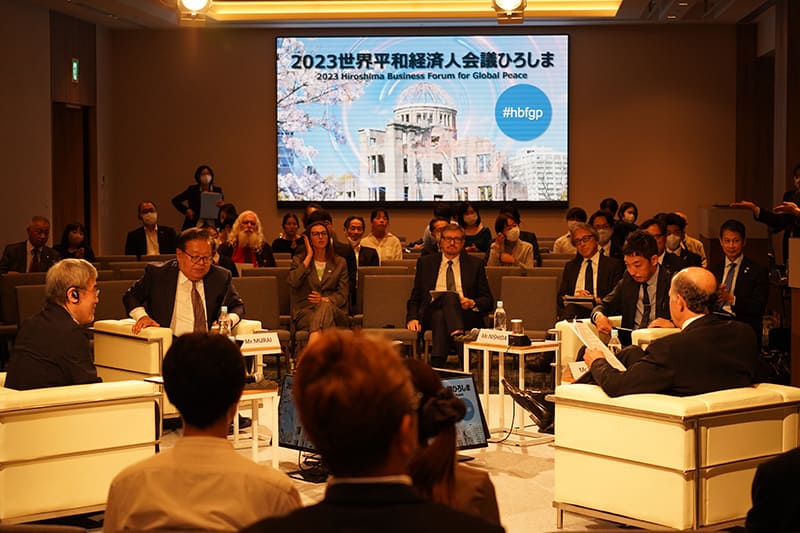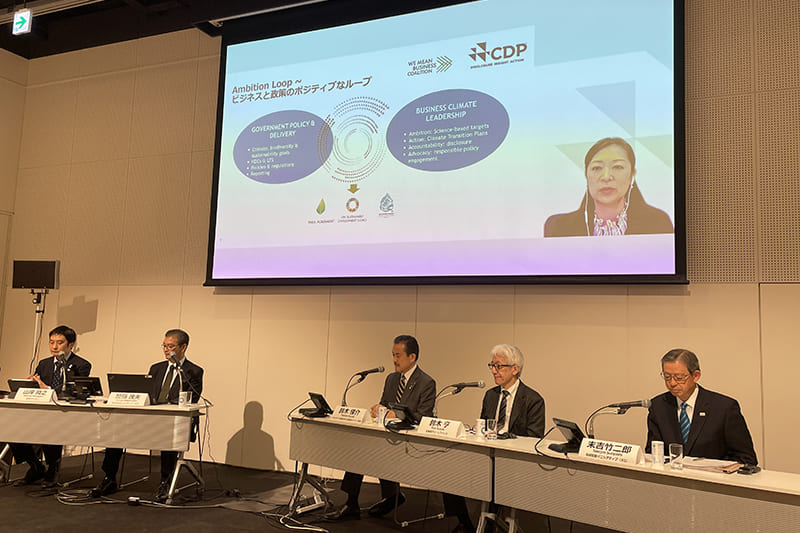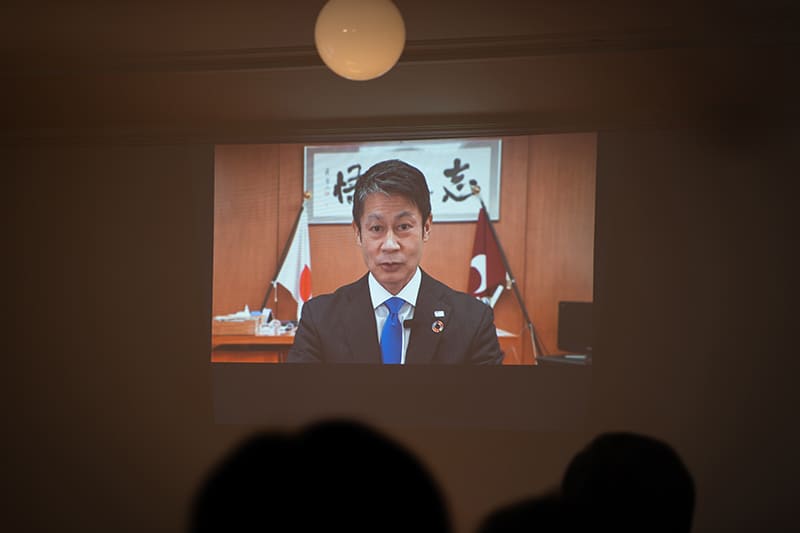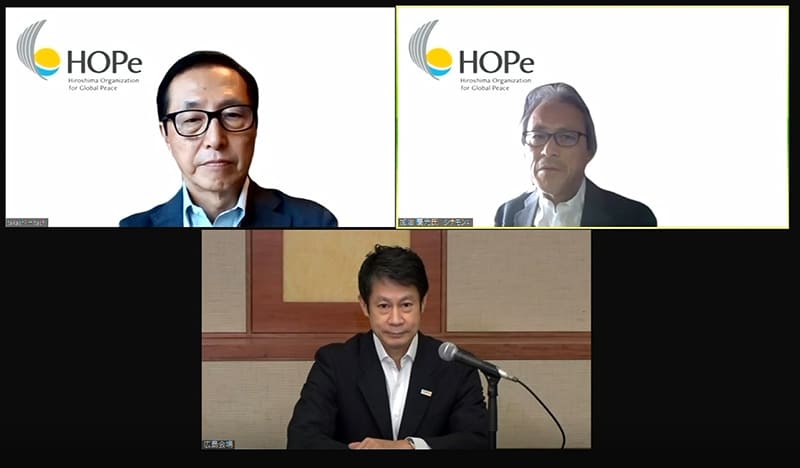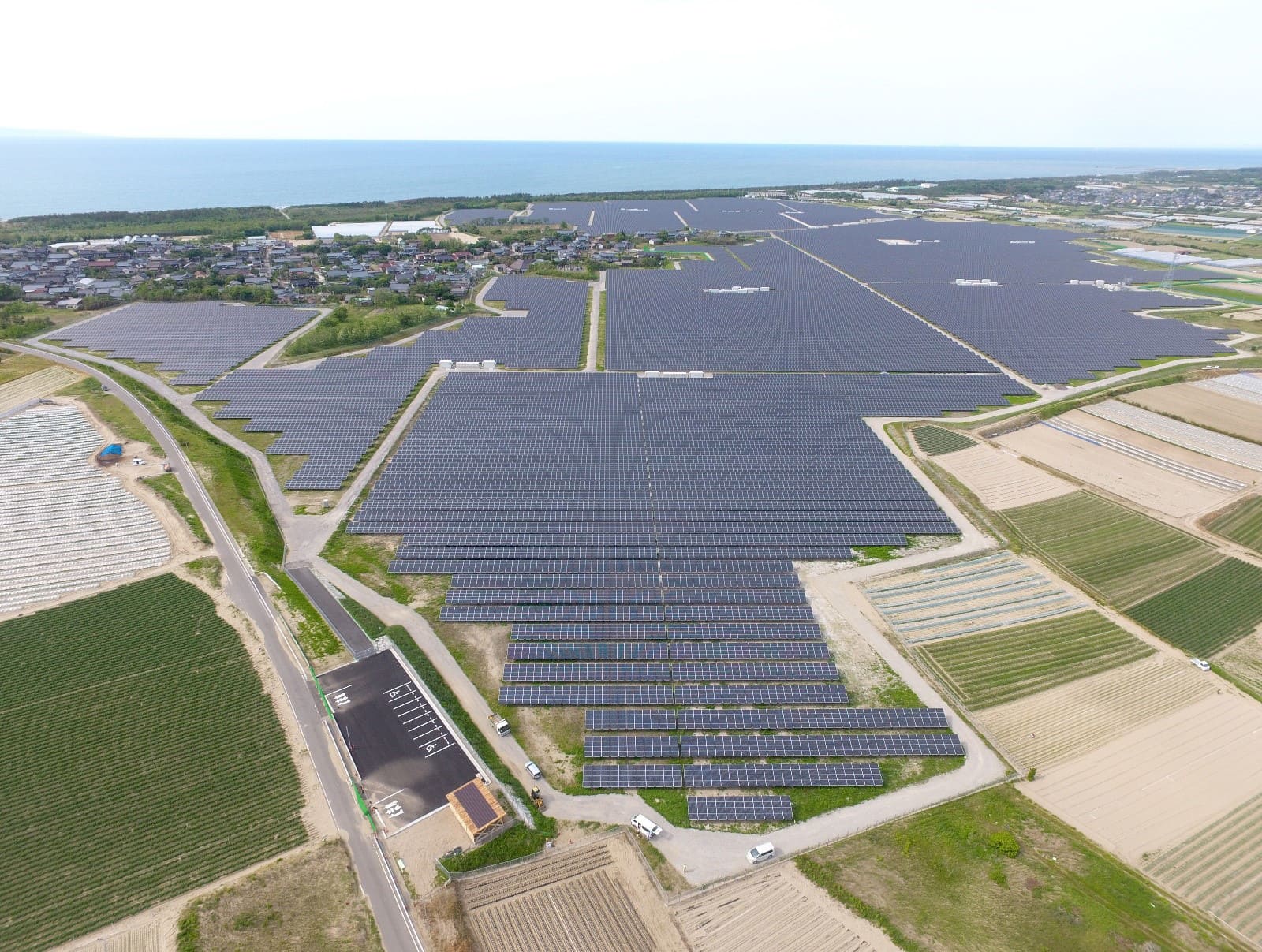October 07, 2022
In risky times, we must act: Hiroshima Business Forum
The past few years have been a time when people came to realize that what is normal today may not be tomorrow. The year 2022 has been a year when people stopped taking peace for granted. Against this backdrop, the 2022 Hiroshima Business Forum for Global Peace was held at the International Conference Center Hiroshima on Sept. 8, gathering speakers from the public and private sectors as well as academia. The event also was livestreamed for a remote audience.
This annual symposium was organized by the Hiroshima Organization for Global Peace (HOPe), a network consisting of the Hiroshima prefectural government and 19 other organizations, supported by the United Nations Institute for Training and Research and the United Nations Information Centre and sponsored by The Japan Times. The organization, headed by Hiroshima prefectural Gov. Hidehiko Yuzaki, has multiple functions — including research, human resource training, communication of information, community-building and resource accumulation — related to global peace and the abolition of nuclear weapons.
Since the first event in 2013, many of the discussions centered around the importance of global peace as a premise for business. But this year was different. All the speakers shared a sense of crisis, and many of their statements were based on what business can or should do when faced with the hard fact that global peace is not there to serve as a premise for business.
That is why the theme for this year’s forum was “Positive peace through business: For world peace and stability.” It carried the message that peace needs to be achieved proactively by every stakeholder, including the business sector, and that there is a greater need than ever for Japan to be the one to disseminate this message to the world.
Two sessions took place, the first one based on the theme “Stable energy supply in the era of economic security and the SDGs” and the second one based on the theme “Human resources development to secure innovation-based economic growth and employment in the midst of global economic instability.”
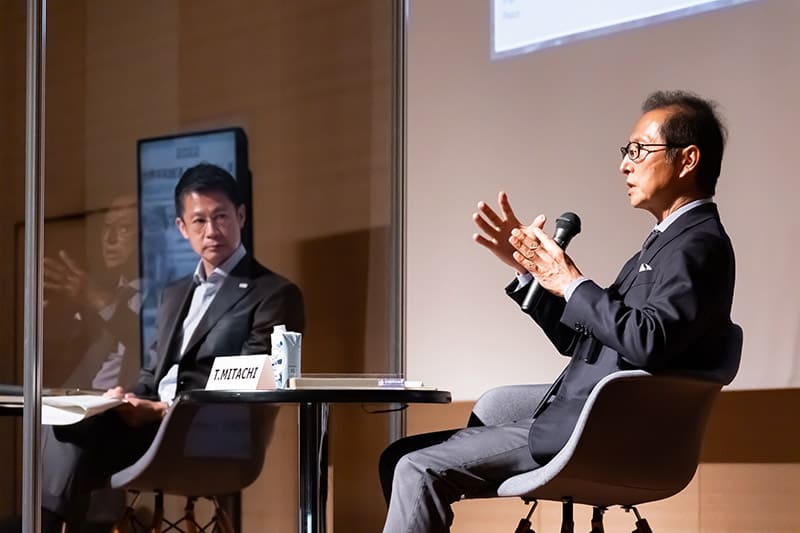
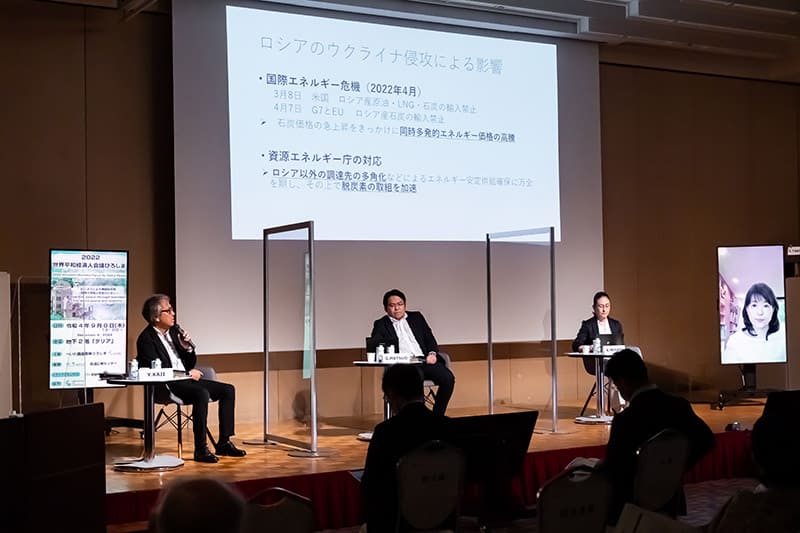
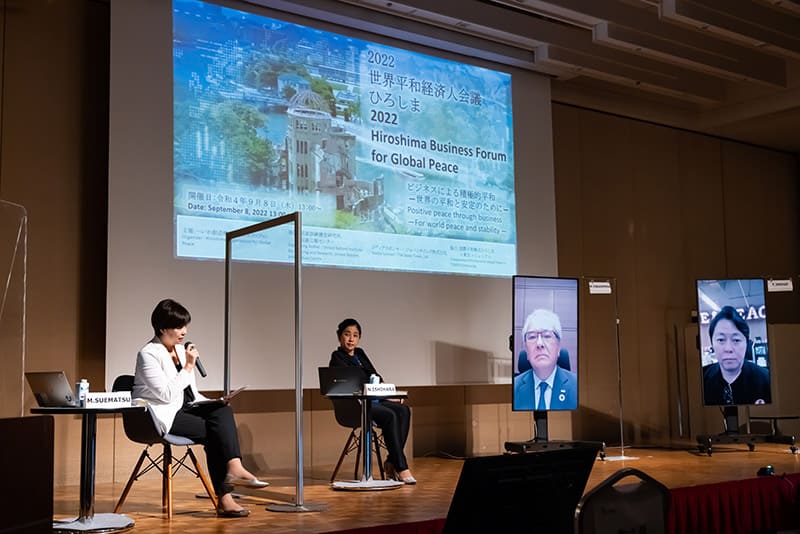
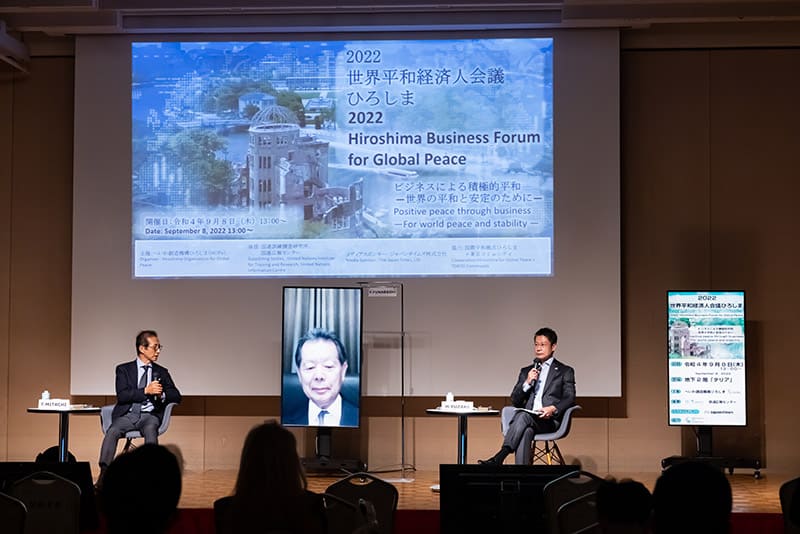
Roots of risks are deep
The forum’s program began with an opening address by Yuzaki and a special talk by Takashi Mitachi, a professor at the Graduate School of Management, Kyoto University.
Mitachi pointed out that the recent pandemic and the war in Ukraine are not the causes of the current global economic instability. “Risks had been there for a long time. Due to these events, existing contradictions and peace-threatening factors were uncovered and multiplied,” he said, referring to examples such as vulnerable countries suffering more when food imports from Ukraine stopped.
Yuzaki said the current instability is the kind that has a major impact on people. “Not only the vulnerable countries but also advanced countries are becoming unstable,” he said.
Mitachi said the current situation exposes the flaws of postwar systems. Yuzaki agreed and said the world created various risks while pursuing economic efficiency under capitalism. “You cannot buy anything if there is nothing to buy. The pursuit of efficiency did not always result in the richness of life,” he said. “We may not be shifting away from capitalism, but the business sector needs to contribute to addressing risks of capitalism to protect its own foundation.”
Mitachi also said the conventional idea is that “the larger the scale is, the better the efficiency and productivity is,” adding, “But in some cases — especially in manufacturing, energy and mobility — dispersion can be more efficient.” He said it is a role of business to create an economic model that can feed the current and future global population without destroying the environment. Another keyword he mentioned is “distribution.” “Instead of allowing a winner to take all, we need to invest in human capital, so that the following generations of those who are suffering now will not continue to suffer,” he said. Yuzaki and Mitachi encouraged the speakers at the panel sessions to exchange thoughts that could be inspiring to many businesspeople.
How to change energy supply
The first session, focusing on energy supply, was moderated by Yoshimitsu Kaji, chairman and chief sustainable development officer (CSDO) of Cinnamon AI, senior principal of Hitachi Ltd.’s Lumada Innovation Hub and a Kamakura smart city architect.
Looking at recent global trends surrounding energy, Kahori Miyake, co-chair of the Japan Climate Leaders’ Partnership and director of the ESG Planning and Promotion Department at Sumitomo Mitsui Trust Bank Ltd., said she sees changes in the market and consumer behavior as well as in the investment landscape in terms of what energy is used by companies, and how.
Sumiko Takeuchi, director of the International Environment and Economy Institute, specially appointed visiting professor at Tohoku University and joint representative director at U3Innovations LLC, was in Paris when the U.N.’s COP 21 climate conference in Paris in 2015 ended with the adoption of the Paris Agreement, a legally binding international treaty on climate change with the goal of limiting global warming to well below 2 degrees Celsius compared to pre-industrial levels, and preferably 1.5 degrees. “The conference venue was filled with feverish excitement, and everyone was hugging each other as if the world had been saved. Of course, I was happy about the outcome too,” she said. “But at the same time, I thought it would be dangerous to discuss matters that impact human lives in the whirl of fever.” She pointed out that the energy issue needs to be discussed from diverse perspectives, and climate change is only one of them.
Takeuchi also noted that a new challenge is taking shape in the context of the green transformation. “Investors feel comfortable investing in green energy because they know that no one would object to it. But it is impossible to switch completely to green energy at once, so there is a need to invest also into the technology that supports the transition period,” she said. However, the question is how the value of stable supplies during the transition period can be assessed. Pointing out that there are many examples of advancing target dates and that there is no guarantee that Japan’s 2050 net-zero target will not be moved up, Takeuchi said, “‘Here is the risk, but decide for yourself whether to invest or not’ — we cannot just say that.”
Go Matsuo, managing director of the Energy Economics and Society Research Institute LLC, talked about the sustainability of society and the economy. While affirming the importance of shifting to renewable energy, he said: “People’s lives depend on energy supply. We need to make a multiple-track scenario taking the loads on the current economy and society into consideration,” and warned that plans are just plans and are subject to change. What if, for some complex reasons in this unstable world, a scheduled plan were changed and there suddenly arose the need to procure fossil fuels to keep everyone’s lives going? What would happen if investment in fossil fuel power plants and long-term purchasing contracts for fossil fuels, terminated long ago, became urgently needed again? He pointed out the risk of thermal power plants going out of business due to deterioration because of inadequate investment in maintenance even though renewable energy is not completely reliable yet. “We cannot let power outages happen. We cannot help but continue a certain amount of investment into fossil fuels and fossil fuel power supply,” Matsuo said. He also mentioned the technological advances needed for nuclear power generation as well as renewable energy.
Takeuchi agreed that renewable energy is not yet entirely reliable in terms of cost, stability and convenience. She also noted that there are downsides to no-use policies on nuclear energy even though it is entirely reasonable to say that the use of nuclear energy should be minimized because of its high potential risks. “The problem is that it has not even been a topic for discussion. We should discuss and decide, considering various risks, keeping in mind that any technology can be used in good ways and bad ways,” she said.
Miyake agreed to the call for a more active discussion regarding nuclear power. “Of course we need to pursue the use of renewable energy the best we can, and clarify what more needs to be done to maximize its potential. But we, the corporate sector, which is the demand side, also need to face the issue of nuclear energy. We have a responsibility as a user,” she said.
Miyake also pointed out that each country is putting in place its own policies to promote the use of renewable energy. “The United States will be accelerating the use of renewable energy under the Inflation Reduction Act, meaning that they will promote domestically produced renewable energy. This is a powerful boost,” she said. “On the other hand, Japan’s offshore wind power technology is highly evaluated internationally,” she added, emphasizing that this is one of the areas that Japan should promote more extensively.
Matsuo stressed the importance of taking measures that fit the geographical and economic conditions of each country. “For European nations, electricity output from gas-fired power plants is easy to control because it comes from pipelines that directly connect to the suppliers,” he said. In Japan’s case, he said, it is important to continue ensuring the economy of Japanese products while handling pressure from the international community to promote products that do not depend on fossil fuel energy during the manufacturing process.
Matsuo then mentioned the issue of employment related to the closure of coal-fired power plants. “The workers need to change jobs. They know how boilers and turbines work in coal-fired power plants, but they do not have any technical knowledge about renewable energy power plants. We need a policy to support their job-switching,” he said.
All three speakers agreed that the stability of energy is closely related to peace as well as social and economic stability. Miyake said that energy self-sufficiency is important for peace because historically wars and conflicts have occurred in many places where fossil fuels are produced. Takeuchi agreed and added that all risks, including those related to international conflicts, need to be taken into account in making energy policies. “The Ukraine crisis will not be the last crisis. We need to keep that in mind when we discuss energy,” she said.
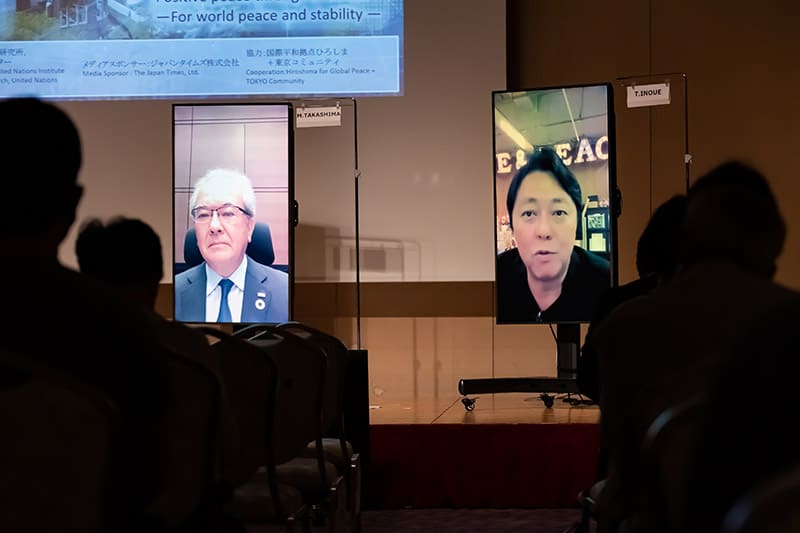
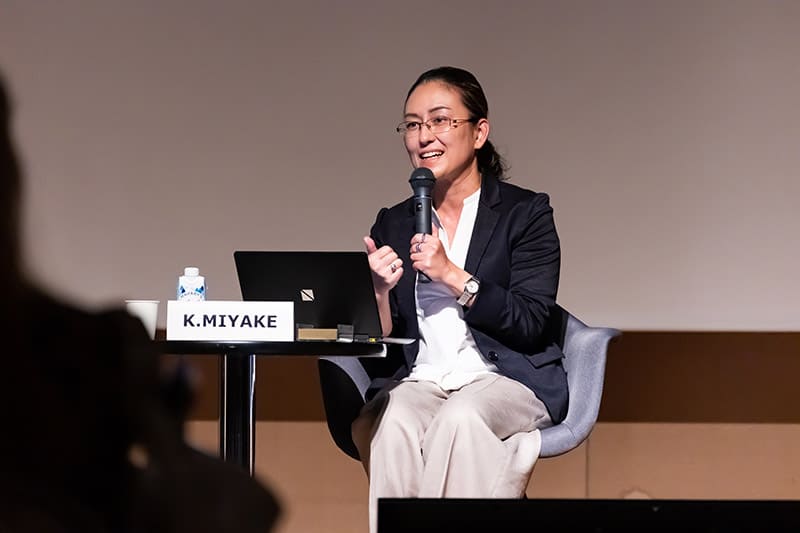
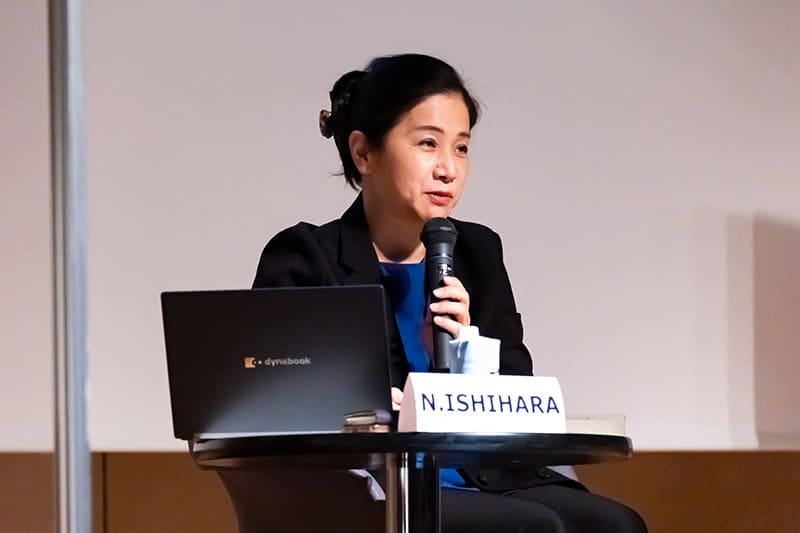
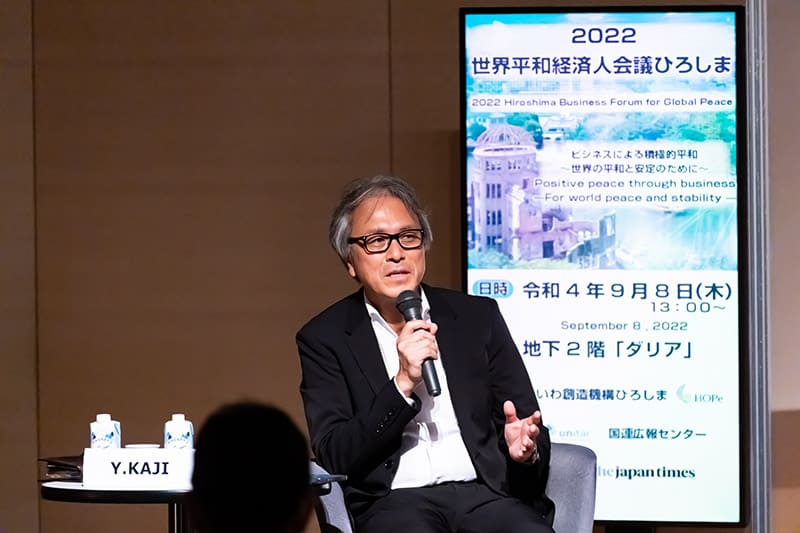
How to gain new skills
The second session, focusing on the development of human resources, was moderated by Minako Suematsu, chairperson, publisher and president of The Japan Times Ltd. She began by saying: “The paper titled ‘The Future of Employment,’ published about 10 years ago by Oxford academics Michael Osborne and Carl Frey, listed the names of professions that are likely to disappear in a decade or two. Ten years have passed, and have we managed to do anything about it?” Then she encouraged the speakers to share their efforts in overcoming challenges related to human resources development.
Naoko Ishihara, director of the Hataraku AI & DX Institute at ExaWizards Inc., who has 23 years of experience in corporate human resources management, has been conducting research on reskilling to find ways to work and gain skills in the era of digitalization. “Companies of our time are expected to solve issues that society is facing through their business activities,” she said. She went on to say that digital tools are not almighty, but they can be used in dealing with all kinds of present-day problems. However, one needs to be equipped with knowledge and skills to use digital tools, which is why Ishihara places importance on reskilling. She also noted that the advantage of digital transformation is not in the use of superior technology, but in the difference it makes for the customer experience. In that sense, not only engineers but also anyone can be a player in digital transformation as long as the training opportunity is there.
Makoto Takashima, president and CEO of Sumitomo Mitsui Banking Corp., shared what opportunities are offered at his company. “We introduced e-learning in our employee training system in 2017, making training available from home. During the last fiscal year, about 31,000 employees used the e-learning system,” Takashima said, adding that digitalization is key in many of the training programs.
Takashi Inoue, president and CEO of Lifull Co. Ltd., shared an honest opinion as an entrepreneur who started from scratch and developed the company into one with more than 1,600 employees. The company has a corporate university offering its employees about 60 programs, along with many other training and career development opportunities. However, Inoue stressed that government, industry and academia need to come together to cultivate human resources. He said it is too much to ask companies to provide everything from human resources development to diversity at a time when many of them cannot afford the extra time or effort and have no choice but to hire young, active and talented workers who can contribute from day one. He suggested that academia do more for training youths and that the government consider new incentive policies such as tax deductions for companies that hire refugees or aged people.
Takashima said incentives are also effective for accelerating innovation. “We incorporated various incentives to our personnel system to help our employees execute new ideas. There will be no tomorrows if we don’t cooperate with each other to make changes. Doing what we have conventionally been doing won’t get us any closer to solving various social issues,” he said.
Another important factor in developing human resources that can contribute to society is diversity. “Diversity can pull you away from all kinds of biases, which is necessary to nurture imagination. Imagination is what you need when you try to understand what challenges there are in the world. You need to imagine being someone other than yourself and imagine what the reality is for that person to truly understand his or her problems,” Ishihara said.
Takashima agreed and said his company is making constant efforts to reach the same level of diversity as its stakeholders. “For example, if our customers consist of half men and half women, we should achieve the same gender ratio among our workers. More than 40% of our business activities are conducted in or for foreign countries, so our target is to have the same ratio of foreign employees,” he said. “Among the 13 outside directors we have, two are women and one is a foreigner. Seven out of 99 executive managing officers are women and 11 are foreigners. The ratio of female workers at managerial positions in our banking sector is 20%, and 33% at our global offices. The figures are still far from ideal, but we are working on it.”
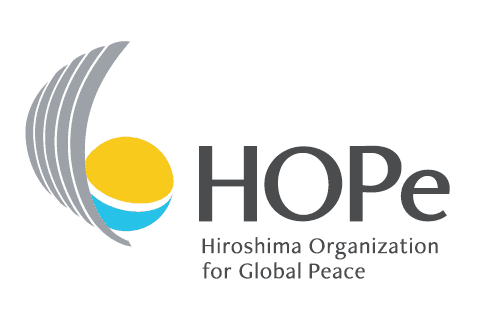
Ishihara also explained why inclusion is important: “If a company has a diverse human resource but is not inclusive enough, it is just creating a lot of workers who do not feel safe to be there. Naturally, they do not concentrate 100% on what they are doing.”
In the closing session, Hiroshima Gov. Yuzaki shared a renewed understanding that peace provides the basis for the development of business and the economy, but he also noted that this basis can collapse. “Right when everyone was focused on addressing climate change, we were suddenly faced with the emergency in Ukraine. What we learned from this is that we need to manage all kinds of risks and prepare ourselves for all possibilities,” he said. Mitachi agreed and said that business leaders need to think how they can contribute to reducing various risks through their businesses and act proactively. Yoichi Funabashi, chairman of the Global Council at The International House of Japan, wrapped up the event by saying Japan should send out a renewed message of peace, business and economy, and promote Japan as a country that can create new global standards and foster innovation.
Aiming to highlight issues related to a sustainable society, The Japan Times gave its support to this event by becoming a media sponsor.


